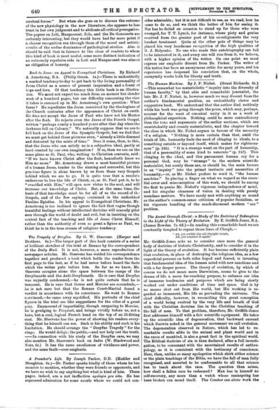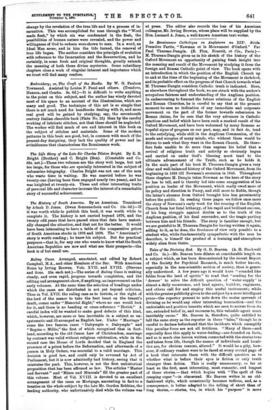The Ascent through Christ : a Study of the Doctrine
of Redemption in the Light of the Theory of Evolution. By E. Griffith-Jones, B.A. (James Bowden. 7s. 6d.)—In reading this remarkable book we are constantly tempted to repeat those lines of Clough,— " eh, yet awhile the old thought retain, Ali, yet consider it again."
Mr. Griffith-Jones asks us to consider once more the general body of doctrine of historic Christianity, and to consider it in the light of the theory of evolution. It has become sufficiently plain that evolution, in place of destroying the religious idea, as a few superficial persons on both sides hoped and feared, is investing that fundamental idea of the human mind with new sanctions and with a far deeper power. The theory of evolution, by which of course we do not mean mere Darwinism, seems to give to the drama of life a more far-reaching purpose, to enhance our idea of immense tendencies and purposes which are being slowly worked out under conditions of time and space. God is by no means shut out from His world, but His working is re- garded as immanent, His life as pervading the universe. The chief difficulty, however, in reconciling this great conception of a world being evolved by the very life and breath of God with the Christian doctrine lies in the Christian teaching of the fall of man. To that problem, therefore, Mr. Griffith-Jones first addresses himself with a fair scientific equipment. He takes up the scientific idea of degeneration, that backward current which Darwin noted in the general movement we call evolution. The degeneration observed in Nature, which has led to re- markable results alike in the animal and plant world and in the races of mankind, is also a great fact in the spiritual world. The Biblical doctrine of sin is then declared, after a full investi- gation, to be consonant with the ascertained results of anthro- pology, as it is consistent with the testimony of conscience. Here, then, unlike so many apologetics which shirk either science or the plain teachings of the Bible, we have the fall of man fully recognised, and asserted to be conformable to all that science has to teach about the race. The question then arises, how shall a fallen race be redeemed ? Man has in himself no self-recovery, any more than a watch whose mainspring has been broken can mend itself. The Creator can alone work the
change by the revelation of the true life and by a process of in- carnation. This was accomplished for man through the " Word made flesh," by which sin was condemned in the flesh, the possibilities of human nature were revealed, and the power and willingness of God to redeem were shown to man. In a word, an Ideal Man arose, and in him the tide turned, the renewal of true life began. The author considers the principle of evolution with reference to the Incarnation and the Resurrection, and he certainly, in some fresh and original thoughts, greatly extends the meaning of both these divine mysteries. Some subsidiary chapters close a work of singular interest and importance which we trust will find many readers.























































 Previous page
Previous page